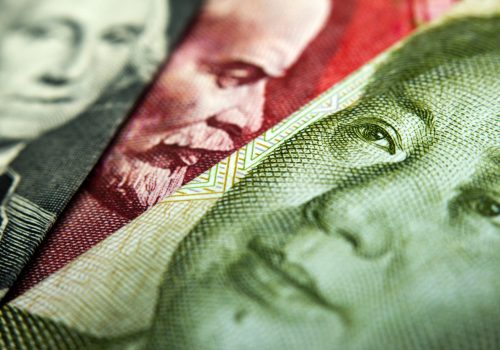Beijing’s message to financial markets: We’re listening
Last week, Beijing sent a powerful message to financial markets: We’re listening. That message by itself caused a massive rally in both the mainland and Hong Kong markets on Wednesday and Thursday of last week.
The message was delivered by Vice Premier Liu He and the Financial Stability and Development Committee under the State Council (FSDC), which is one of the strongest mouthpieces for economic policy support available to Beijing, short of a speech by Li Keqiang or Xi Jinping. But fundamentally, the statement was reactive to the selloff that had taken place earlier in the week, which saw Chinese equities and bonds drop by margins unseen since 2008 and reflected numerous economic threats metastasizing at once. These included renewed pressure on China’s economy because of the emerging Omicron outbreak, multiple defaults by Chinese property developers, the threat of delisting Chinese stocks in the United States, further regulatory crackdowns against Chinese platform and technology firms, and rising political risk associated with China’s perceived political alignment with Russia.
The sudden need for a statement from Liu He’s office highlights how the Russian invasion of Ukraine has created a massive wedge between political leadership in China and technocratic officials managing financial markets. Political leaders are concerned primarily with how China can use its relationship with Russia to advance China’s interests in a longer-term competition with the United States and US-led alliances, and are willing to incur economic costs to do so. Technocratic China, in the voice of Liu He’s FSDC, seems to have reminded political leaders this week that China remains highly reliant upon stable financial market conditions, needs significant inflows from foreign investors, and requires at least the perception of well-executed domestic economic policies consistent with liberalizing markets. China’s perceived alignment with Russia, along with problems in policy messaging and coordination over the past year, were damaging all of those objectives.
Foreign investors have been reducing their exposure to China and there is a growing contingent who think China is becoming “uninvestable.” Financial technocrats have spent years establishing channels like the Stock and Bond Connect programs to invite foreign investors into Chinese markets. China faces inevitable pressure from capital outflows. It sits on top of the world’s largest money supply: over $38 trillion, expanding at a pace of around $3 trillion per year. This creates incentives for Chinese households and corporates to continuously diversify into foreign assets. This week, the promise of long-term counterbalancing inflows back into Chinese markets came under attack from multiple channels, and Beijing felt compelled to respond, or at least try to reassure financial markets. Whether or not this message succeeds will become clear over the coming months.
The substance of the FSDC announcement was less significant than the statement itself, which refuted growing market fears that Beijing was either asleep at the wheel, indifferent to market contagion, or actively contributing to some of the selloffs in technology and platform companies. The FSDC statement contains five key messages, all corresponding to some specific market concern in recent weeks. In order, those concerned the state of China’s economy, pressure on property developers, delisting of Chinese stocks, regulation of technology and platform companies, and specific concerns about the Hong Kong market. The order probably does indicate a relative ranking of priorities for Beijing.
On March 15, the NBS announced surprisingly upbeat growth numbers for the first two months of the year. But instead of boosting market confidence, investors questioned the quality of data and rushed to exit their positions, fearful that Beijing would not actually take concrete steps to boost the economy this year, and would merely massage the economic data. The FSDC statement pledged to “concretely improve the economy in Q1 and monetary policy will be more proactive.” This is a clear message that at least financial technocrats do not see a solid foundation in the recovery so far in Q1 and monetary easing remains on course. Technically, the PBOC could cut interest rates on medium-term lending (MLF) rates at any time, but the most likely window remains the next regular MLF operation on April 15. The FSDC statement may even generate momentum to take a more dramatic step and cut benchmark deposit rates. This has not occurred since October 2015.
The second message involved property developers and did not break much new ground, merely pledging to study and unveil forceful measures to prevent and address risks. Local governments have already unveiled several initiatives to boost demand, and Beijing has helped them encourage asset management companies and state-owned developers to take over projects from distressed firms and keep construction going. But the problem in China’s property sector right now is that no one is buying houses, with 30-city sales down 48% y/y in the first 14 days of March, deepening declines from earlier in the year. Supply in recent years has run far ahead of fundamental demand from owner-occupiers. Speculators filled in that gap in the past but those investors are now staying on the sidelines, particularly as the Omicron outbreak gains momentum. It is possible Beijing will push hard on property tycoons themselves to use their own money to alleviate financial pressures and repay debt, but ultimately, the recovery of the sector depends on a recovery in sales.
In terms of the potential delisting of Chinese stocks from US markets, the FSDC said China and US are making positive progress and working on detailed plans, and that the Chinese government continues to support all firms listing overseas. The CSRC has pretty much said the same thing in recent days but clearly, a message from the FSDC is much stronger and may suggest that concrete concessions to US regulators will soon be on offer. Given the rapidly approaching delisting timelines, significant progress is likely to be necessary to maintain investor confidence that the delisting threat is being delayed or eliminated. Talk here is cheap, even from Liu He’s office, as these issues have remained unresolved for years.
The message regarding platform and technology firms should probably be interpreted far more cautiously than the immediate optimism from equity markets over the past two days. The statement only says that regulatory work will make progress while maintaining stability (regulators will not stop their campaign, but they will try to make it less destructive to the market). Regulatory work needs to be transparent and anticipated (in our interpretation, this means the FSDC needs to know what the rest of the bureaucracy is doing). The statement also says that government ministries need to coordinate with financial regulators before issuing policies that will have a major impact on capital markets. This could mean more coordination behind policies and less immediate political risk of events such as the crackdown on education technology firms last July, which wiped out valuations in the sector.
The FSDC statement addresses a real concern for financial markets, as policymaking has become far less coordinated under the State Council and individual ministries have taken their own initiatives to respond to leadership priorities such as “common prosperity,” without much concern for the potential collateral damage. But this problem persists, even if the FSDC is aware of the costs. After the FSDC meeting, all relevant financial regulators issued their own version of a statement echoing the FSDC’s priorities, but there was nothing from the Cyberspace Administration of China (CAC), from the Ministry of Education, or even from the State Administration for Market Regulation (SAMR). All of these agencies generated their own forms of market risks over the past year. Bureaucratic conflicts in the service of leadership priorities can still easily break down policy coordination and effective messaging to markets.
In response to the statement, optimistic sentiment surged in financial markets. There was a low threshold for good news to clear after the concatenation of factors that had produced the selloff earlier in the week. The credit impulse should finally turn positive in April or May, and equity market performance has historically improved under these circumstances.
Beijing has clearly demonstrated their awareness of the problematic narratives that have been developing around the Chinese economy, and in a politically important year, an escalating financial market rout is one of the last things political authorities want to see. But Beijing’s concern should now be focused on the effectiveness of policy support, not the tone of leadership statements. And there are still many hills to climb to address the real concerns of investors that produced the selloff in the first place.
Daniel H. Rosen is a Senior Fellow with the Atlantic Council GeoEconomics Center
Logan Wright is a Contributor to the Atlantic Council and partner at Rhodium Group

At the intersection of economics, finance, and foreign policy, the GeoEconomics Center is a translation hub with the goal of helping shape a better global economic future.
Further reading
Tue, Oct 5, 2021
China Pathfinder: Annual Scorecard
Report By
Over the past eight months, teams from the Atlantic Council and Rhodium Group have taken a dive into China’s economy to address a fundamental question: Is China becoming more or less like other open-market economies?
Thu, Feb 25, 2021
Delist or not delist: A $2.2 trillion US-China auditing dispute
Issue Brief By Jeremy Mark
The economic and financial forces set in motion by the COVID-10 pandemic—global recession and ultra-loose monetary policies that have driven a cross-border search for higher yield—have contributed to a slow shift of international capital toward China’s markets. Now, intensified US-China tensions—especially the targeting of Chinese companies for delisting from US stock markets—have the potential to heighten that trend.
Fri, Feb 18, 2022
Russia and China: Partners in Dedollarization
Econographics By Mrugank Bhusari, Maia Nikoladze
Russia has virtually stopped receiving Dollars for its exports to China. Does the US have reason to be concerned?
Image: Hong Kong - August 25, 2021 : People walk past the Exchange Square complex, which houses the Hong Kong Stock Exchange (HKEX) in Central, Hong Kong.


